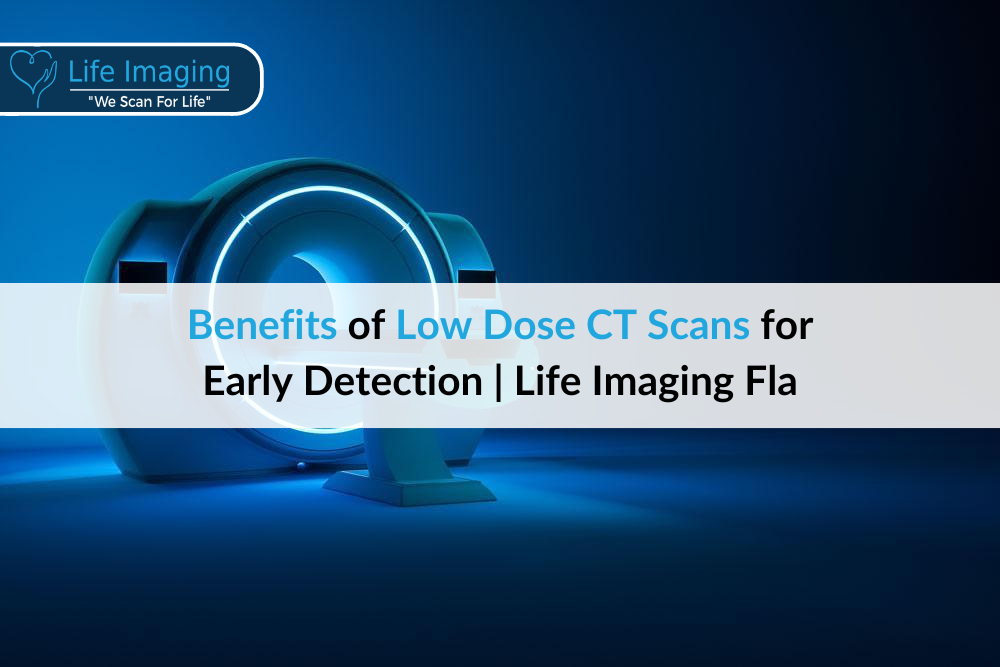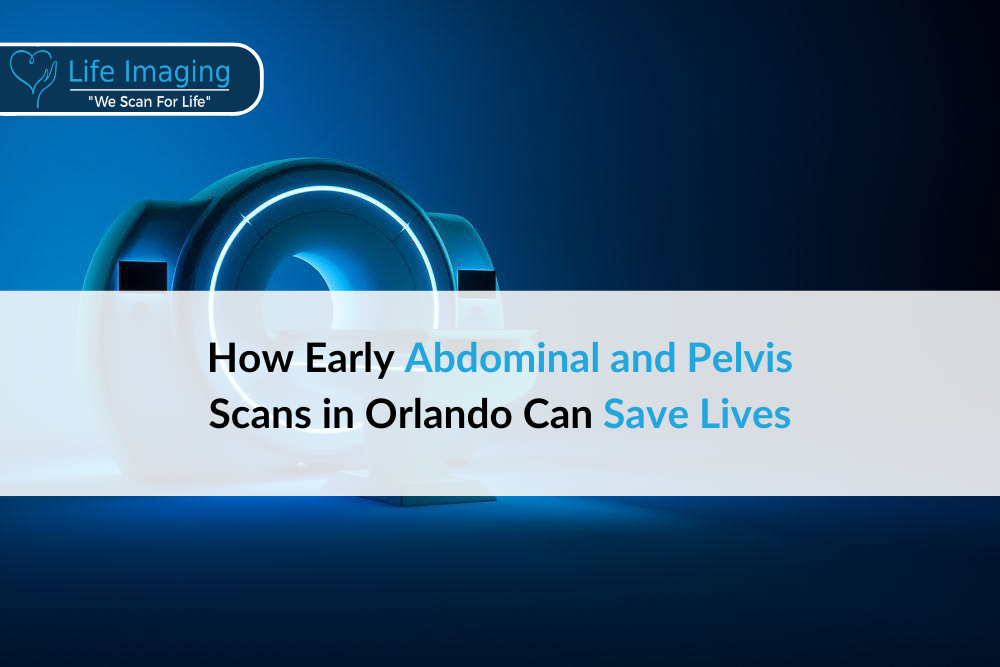
Steps to Take for Orlando Residents If Your Heart Scan Shows Abnormal Results
If you live in Orlando and recently had a heart
NOW OPEN! We’re excited to announce our new location in Jupiter, FL is now open! Learn more.

In the realm of medical imaging, advancements in technology have greatly improved the early detection of life-threatening diseases, such as heart disease and cancer. Among these advancements, low dose computed tomography (CT) scans stand out for their ability to provide detailed images with a significantly reduced radiation exposure.
Low dose CT scans represent a crucial breakthrough in medical imaging technology. By minimizing radiation exposure while maintaining high image quality, these scans ensure a safer screening option for patients, particularly those requiring frequent monitoring. The ability of low dose CT scans to detect abnormalities at very early stages can be life-saving, particularly in diseases where early diagnosis significantly improves the prognosis.
We’re here to explore the myriad advantages of utilizing low dose CT scans, from their precision and speed to their role in reducing cumulative radiation exposure. As we navigate through the benefits, the importance of this technology in preventive health care becomes undeniable.
One of the most significant benefits of low dose CT scans lies in their ability to dramatically reduce the amount of radiation to which patients are exposed compared to standard CT scans. Traditional CT scans, while highly effective in providing detailed internal images, have often raised concerns regarding the potential risks associated with high radiation doses, especially for patients who require multiple scans for ongoing monitoring.
Low dose CT scans address these concerns by using advanced technology to capture equally detailed images with a fraction of the radiation. This makes the process safer for patients and reduces the long-term risks associated with radiation exposure. This technology is particularly beneficial for early detection programs, where patients undergo screening more frequently.
The ability to detect diseases early on is perhaps the most crucial advantage of low dose CT scans. These scans can identify health conditions before symptoms become apparent, providing a critical window for early intervention. Early detection is particularly important in diseases like cancer and heart disease, where early stages might not present noticeable symptoms, but progressing the condition can lead to serious health issues or even become life-threatening.
For instance, in lung cancer screening, studies have shown that low dose CT scans can help reduce mortality rates by detecting cancers at stage 1, when they are most treatable. The National Lung Screening Trial (NLST) by the National Cancer Institute has shown that screening with low dose CT scans can reduce lung cancer deaths by up to 20% compared to chest x-rays.
Low dose CT scans are not only effective but also efficient. The actual scanning usually takes only a few minutes, and the entire procedure can often be completed within half an hour. This quick turnaround time is essential not only for the comfort of the patient but also for the swift diagnosis and initiation of treatment if needed.
This efficiency does not compromise the quality of the images produced. Even with the reduced radiation dose, these scans generate high-quality images that are crucial for accurate diagnosis and treatment planning. As a result, healthcare providers can better plan and execute a treatment strategy that is both timely and effective.
The advancement in low dose CT technology has also made these scans more accessible and cost-effective for both healthcare facilities and patients. As the technology has become more widespread, the costs associated with these scans have decreased, allowing more patients to benefit from this advanced screening tool without significant financial burden.
This accessibility is particularly important in densely populated areas like Miami, where the demand for efficient, effective healthcare services is high. By offering low dose CT scans, facilities like Life Imaging Fla contribute to a healthcare environment where early detection and preventive care are more readily accessible to the general population, potentially lowering overall healthcare costs by reducing the need for extensive treatments for advanced diseases.
Low dose CT scans not only provide a multitude of health benefits but also enhance the overall patient experience. The speed and simplicity of the procedure significantly reduce the stress and discomfort typically associated with medical testing. For individuals who might experience anxiety when undergoing medical procedures, the non-invasive nature and quick completion time of low dose CT scans make the experience more manageable.
The high-resolution images produced by low dose CT scans allow for superior diagnostic accuracy. These detailed images enable doctors to observe minute changes in the body that might indicate early stages of disease. By catching these subtle signs, medical professionals can diagnose conditions much earlier than with traditional methods, allowing for interventions that can halt or slow the progression of diseases.
The information provided by low dose CT scans is crucial in planning effective treatment strategies. Accurate diagnostics lead to targeted treatments, which can improve patient outcomes and reduce the likelihood of complications. In the context of diseases like cancer, where early detection is directly linked to survival rates, the importance of such precise imaging cannot be overstated.
Empowering Preventive Healthcare
The availability of low dose CT scans plays a significant role in the shift towards preventive healthcare. By detecting diseases early, these scans empower patients to take preemptive action, which can lead to better health outcomes and a decrease in healthcare costs over time. This proactive approach is especially important in managing chronic diseases, where early intervention can prevent complications and improve quality of life.
Preventive healthcare not only benefits individual patients but also helps alleviate the burden on healthcare systems. By reducing the incidence of advanced diseases through early detection, low dose CT scans contribute to more sustainable healthcare practices.
In addition to their health and economic benefits, low dose CT scans also make a positive impact on the environment. By using less radiation, these scans reduce the amount of radioactive waste generated. This decreased environmental footprint is part of a broader movement within the medical community to adopt more sustainable practices without compromising patient care.
Healthcare facilities that use low dose CT technology demonstrate a commitment to both patient safety and environmental responsibility. For progressive communities like Miami, where environmental conservation is increasingly prioritized, such advancements align well with local values and contribute to the community’s overall wellbeing.
In Miami, a city known for its vibrant culture and diversity, health services must be adaptable to meet the varied needs of its residents. Life Imaging Fla recognizes this necessity and leverages low dose CT scan technology to provide tailored health solutions that cater to the unique demographics of the city. Whether it’s routine screening or more detailed diagnostics, the flexibility of low dose CT scans ensures that all community members have access to personalized and effective health management strategies.
For chronic diseases such as heart disease or various types of cancer, early detection can significantly alter the management and outcome of the condition. Low dose CT scans provide a critical tool in this context, offering early insights that can guide preventive measures and treatment decisions. This is particularly significant in a healthcare landscape where timely information can dramatically influence patient prognosis.
Life Imaging Fla integrates these advanced imaging solutions to enhance disease management capabilities, providing a robust foundation for healthcare providers to deliver care that is both proactive and responsive. By detecting subtle health changes before they evolve into more serious conditions, low dose CT technology is essential for maintaining community health.
Beyond individual patient care, low dose CT scans contribute to broader medical research and innovation. With their high-resolution imaging, researchers can study disease patterns, progression, and treatment responses more effectively. This contributes to the development of new treatments and understanding of diseases, which ultimately benefits the wider medical community.
Life Imaging Fla supports such research endeavors by providing detailed imaging data that can be used in clinical studies. By participating in this aspect of medical research, the facility plays a pivotal role in advancing healthcare technologies and treatment methods, ensuring that the Miami community and beyond benefit from cutting-edge medical insights.
Understanding one’s health is the first step towards effective disease prevention and management. Life Imaging Fla is committed to not only providing top-notch imaging services but also ensuring that patients are educated about their health conditions and the implications of their imaging results. This educational approach empowers patients to make informed decisions about their healthcare, fostering a more interactive and participatory health management process.
By demystifying medical information and making it accessible, Life Imaging Fla strengthens the role of patients as active participants in their health care. This commitment to education helps build trust and communication between patients and healthcare providers, which is essential for effective health outcomes.
Throughout this discussion, we’ve explored the numerous advantages that low dose CT scans offer, from enhanced diagnostic precision to a substantial reduction in radiation exposure, making them a cornerstone of modern preventive medicine. Life Imaging Fla fully utilizes this technology to revolutionize how early disease detection and management are approached.
By integrating low dose CT scans, our imaging center in Miami, FL, ensures that every patient receives high-quality, personalized care aimed at detecting and managing health issues before they escalate into more severe problems. This proactive approach saves lives and educates and empowers the community, contributing to a healthier, more informed Miami.
As we move forward, the importance of accessible, efficient, and safe medical imaging continues to grow. Our team is committed to leading this charge, continually advancing our technology to meet the needs of our diverse community. We invite you to join us in embracing these innovative solutions that significantly enhance patient care and outcomes.
Don’t wait to take control of your health. Contact us today to learn more about our low dose CT scans and schedule your appointment. Take the first step toward a healthier future by choosing advanced, preventive care—because early detection is your best protection!

If you live in Orlando and recently had a heart

Calcified lymph nodes are small, hard lumps that can develop

Low dose CT scanners are advanced tools that play a

Virtual colonography is an advanced way to check the health

Feeling anxious before a medical scan is common. Many people

Lung cancer is a serious disease that starts in the

* Get your free heart scan by confirming a few minimum requirements.
Our team will verify that you qualify before your scan is booked.
Copyright © 2025 Life Imaging – All Rights Reserved